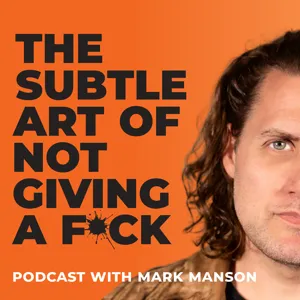Podcast Summary
Unrealistic goals and drastic changes can lead to failure in goal setting: Setting achievable goals and making gradual changes are essential for success in goal setting. Being realistic, understanding the process, and aligning changes with your identity are crucial.
Setting unrealistic goals and trying to change too much at once can lead to failure in goal setting. Sharing their personal experiences, Drew and the speaker discussed their catastrophic goal setting failures from their past. The speaker recounted his failed attempts to get a six-pack for four consecutive years, attributing his failure to unrealistic expectations and lack of understanding about nutrition and fitness. Drew shared his experience of attempting to get consistent exercise by making drastic changes all at once, which led to a short-lived commitment and overall misery. Both agreed that setting achievable goals and making gradual changes are essential for success in goal setting. They emphasized the importance of being realistic, understanding the process, and making changes that align with your identity.
Overwhelmed by too many changes? Prioritize one goal at a time: Focus on one goal at a time, optimize for sustainable habits, and make the process enjoyable for best results.
Trying to make multiple significant changes to your life at once can lead to an increased sense of identity crisis and energy drain. It's important to prioritize one goal at a time and optimize for sustainable habits. Another key takeaway is to approach goal setting with a mindset that makes the process enjoyable and manageable, rather than a grueling and painful experience. This could involve finding ways to make the goal fun, creating a competition for yourself, or seeking support from friends. Ultimately, the most successful changes you make in life are likely to be the result of finding a way to make them enjoyable and sustainable, rather than grinding through them with brute force.
Setting smaller goals leads to greater success: Breaking down larger goals into smaller, manageable steps can help build momentum and motivation, leading to a sense of accomplishment and making it harder not to achieve the goal
Setting smaller, achievable goals can lead to greater success than aiming for lofty, unrealistic ones. The speaker shares his personal experience of writing a book, where he found that setting a specific goal with a clear system in place helped him make progress despite initial struggles. He emphasizes that focusing on the systems that make a goal more likely to happen, rather than the goal itself, can lead to greater success. By breaking down larger goals into smaller, manageable steps, individuals can build momentum and motivation, leading to a sense of accomplishment and the ability to extend their goals. This approach can help create an environment where it is more difficult not to achieve the goal than to achieve it.
Simplify your system for success: Maintain a consistent routine, focus on essentials, and find enjoyment in your goals for long-term success.
Having a simple and effective system in place can lead to success in various areas of life. This can be applied to writing, health, and hobbies. For instance, having a consistent writing routine with a simple setup, like a laptop at a cafe, can help one focus and be productive. Similarly, maintaining a simple and healthy diet, free of distractions like junk food, can support overall well-being. Another example is finding a physical activity that is enjoyable, social, and provides variety, like jujitsu. The challenges, such as expense and travel, can be outweighed by the benefits, including social connections, constant learning, and fun. Research suggests that pursuing goals with others may also increase the chances of success. Additionally, incorporating elements of competition, growth, and positive reinforcement can make the process more engaging and enjoyable. Overall, keeping things simple and focusing on the essentials can lead to consistent progress and long-term success.
Creating friction and authentic motivation: Personal values and genuine desire lead to perseverance and success in challenging activities, while external motivators may lack commitment and lead to quitting. Friction, like financial investment or time commitment, can help reinforce commitment and discourage quitting.
Creating intentional friction and authentic motivation are key to sticking with activities or goals that are challenging and intellectually stimulating, such as jujitsu or language learning. The speaker shared personal experiences of setting goals based on external motivators, like impressing others or looking smart, and how those goals ultimately failed due to a lack of personal value or commitment. However, when motivated by core personal values or a genuine desire to learn or grow, the speaker found that they were more likely to persevere through the challenges and succeed. The creation of friction, such as financial investment or time commitment, can also help discourage quitting and reinforce the commitment to the goal.
Motivation behind goals matters: Understanding true motivation behind goals is crucial for sustainable progress. Seek self-awareness, consider intrinsic motivation, and avoid goal-setting for social validation.
While setting goals, such as learning a new language, can be rewarding, the motivation behind the goal is crucial. The speaker shares his experience of learning languages, including Russian, Spanish, and Portuguese, and how the social validation he received was fleeting. He emphasizes that the time and energy invested in achieving these goals for the sake of impressing others is a poor exchange. The speaker also highlights the importance of self-awareness and understanding the true motivation behind our goals. He recommends therapy as a tool to help gain this self-awareness and better understand our motivations. The speaker also touches on the topic of intrinsic and extrinsic motivation and suggests that focusing on intrinsic motivation, such as the enjoyment or personal growth aspect of a goal, may lead to more sustainable and fulfilling outcomes.
The importance of intrinsic motivation for long-term goal success: Intrinsic motivation, derived from enjoyment and value in the activity itself, is crucial for long-term goal success as it sustains us through challenges, while extrinsic motivation from external rewards can be short-lived.
Both extrinsic and intrinsic motivations play important roles in achieving goals, but intrinsic motivation is key for long-term success. Extrinsic motivation comes from external rewards or forces, while intrinsic motivation stems from the enjoyment and value we find in the activity itself. Extrinsic motivation can be short-lived and may lose its appeal over time, while intrinsic motivation comes from within and can sustain us through challenges. To make the most of our goals, it's essential to find a way to make the process intrinsically rewarding, even if there is an external reward at the end. By focusing on the intrinsic value and enjoyment we find in the activity, we're more likely to stay motivated and committed to our goals in the long run.
Finding motivation in mundane tasks: Creating a fun learning experience, setting clear goals, and finding enjoyment in the process can lead to success and avoid burnout
Finding intrinsic motivation in any task, even the most mundane ones, can lead to success and enjoyment. Ollie emphasizes that you don't need to be naturally passionate about something to find motivation in it. By creating a fun and engaging learning experience, you can improve your performance and avoid burnout. Additionally, setting clear and specific goals is an effective way to stay focused and accountable. During their discussion, they shared their personal goals for 2024 and encouraged listeners to do the same. They plan to follow up with listeners later in the year to gather data on goal progress and achievement. The speaker shared his personal experience of setting a goal to run a marathon on his 40th birthday. He created a detailed plan, scheduled his runs, and made necessary arrangements for travel. By focusing on his goal and finding enjoyment in the training process, he has made significant progress and is enjoying the experience. In summary, finding intrinsic motivation in tasks, setting clear goals, and creating a detailed plan can lead to success and enjoyment.
Enjoy marathon training with progress and goals, Tackle sleep habits one step at a time: To improve sleep, set rules like limiting TV shows after 9 PM and turning off lights with timers, tackle habits one at a time for significant improvements in well-being.
Training for a marathon can be made enjoyable through tracking progress and setting achievable goals each week. Sleep, on the other hand, is a complex habit that requires addressing multiple aspects, such as good nutrition, limiting screen time before bed, and establishing consistent bedtime and wake-up routines. Instead of trying to change everything at once, it's recommended to tackle each habit one at a time, allowing enough time for each new behavior to become automatic before moving on to the next one. For example, improving sleep could involve setting rules like not starting new TV shows after 9 PM and using timers to turn off lights at a specific hour. These small changes, when done consistently, can lead to significant improvements in overall well-being.
Simple rules for better sleep: Consistently following simple rules like limiting screen time, maintaining a cool, dark sleeping environment, and setting a regular bedtime can significantly improve sleep quality and overall well-being.
Establishing simple rules and routines can significantly improve your sleep quality and overall well-being. The speaker shares his experience of implementing such rules in his own life, including limiting screen time before bed, maintaining a cold, dark sleeping environment, and setting a regular bedtime. He emphasizes the importance of consistency and avoiding exceptions, even if it's a struggle at first. Additionally, he discusses the challenges of giving up caffeine and the impact it has on his energy levels and sleep. By sharing his personal experiences and insights, the speaker encourages listeners to set their own goals for improving their sleep habits and offers support through the Mark Manson website. Overall, the conversation highlights the importance of prioritizing self-care and creating sustainable habits for better health and productivity.
Sharing and tracking goals with a community: Sharing goals with a supportive network and tracking progress regularly can foster accountability and community support, leading to successful goal achievement.
Accountability and tracking progress are essential elements in achieving personal goals. During the upcoming year, the speakers plan to collect data from their audience regarding their goals, adherence, and struggles. They are excited about the potential insights and anecdotes that will emerge from this process. Moreover, they will hold themselves accountable by sharing their progress publicly. The speakers acknowledged their extrinsic motivation, which stems from their desire to meet others' expectations. Overall, this approach emphasizes the importance of community support and transparency in fostering goal achievement. So, as you embark on your own goals this year, consider sharing them with a supportive network and tracking your progress regularly.



